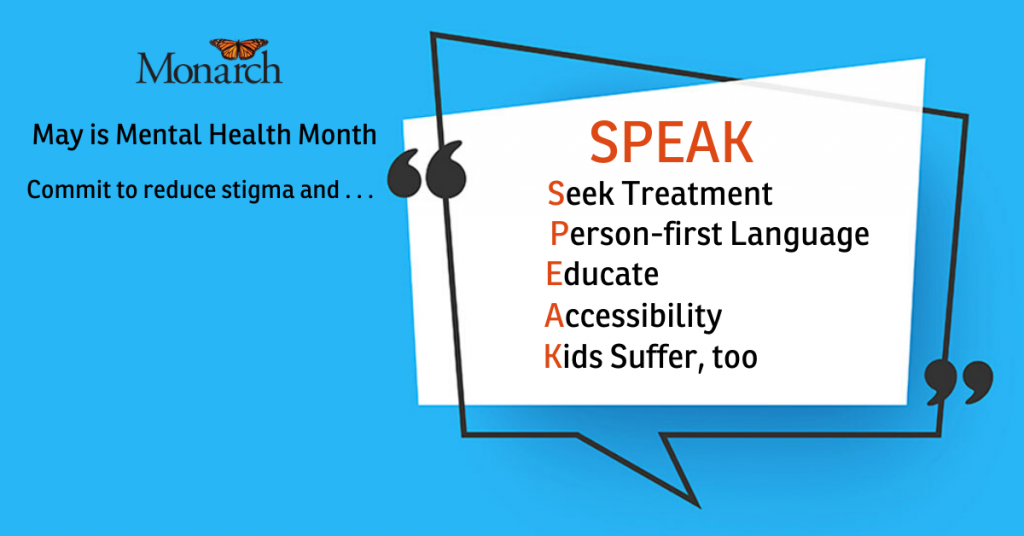Mental Health Month: SPEAK to Help Reduce Stigma
May marks the start of Mental Health Month and this year, let’s make it more than a conversation.
Let’s make a commitment to the more than 42.8 million people in the U.S. living with a mental illness to reduce the stigmatization that occurs when we don’t truly understand what living with a mental illness really means.

The National Alliance on Mental Illness (NAMI) defines stigma as the feeling when someone, or you yourself, views you in a negative way because you have a mental health condition. Stigma can manifest into rejection, bullying and even discrimination and it is detrimental to people on a journey to mental wellness.
SPEAK is a five-letter word that can help reduce stigma and can have a life-changing impact on a person living with mental illness. We reduce stigma when we SPEAK:
Seek treatment
Few people go through life without any health challenges. Cancer, heart disease, chronic pain, diabetes, mental illnesses, and more touch every family at some point – and often there is a correlation with the mind and body. That’s why it’s important to treat mental illness the way we treat physical illness. According to NAMI, one in five people will suffer from a mental illness in their lifetime. It’s important to go to the doctor for your mental health, too.
We offer services statewide. Find out information about the Monarch locations available near you.
Person-first Language
Language around how we communicate mental health is significantly important in reducing stigma because your mental health does not define you. Instead of saying, “I’m bipolar” or “that person is bipolar.” Instead say, “He or she lives with bipolar disorder” or “I have bipolar disorder.” You come first, not your illness.
Educate
Give yourself grace and educate yourself on what you’re going through. Talk to your provider and research the condition you have, its causes and effects. This will empower your journey to mental wellness and gives you the ability to educate others to reduce misinformation. See the links below to find out more about common mental health diagnoses.
Accessibility
From apps to telehealth options, accessibility to treatment is better today than it has been. Monarch strives to make sure people have access to the care they need when they need it through telehealth services and telephone appointments. Be open to seeking health care through improved technological options. Telehealth and telephone appointments offer flexibility, ease of access and convenience.
Kids suffer, too
Sixty-four percent of youth with depression do not seek mental health treatment. We need to transition away from the “walk it off” or “it’s just a phase” attitude and advocate for mental health for youth. Monarch offers mental health services to children and teenagers through its In-Home Therapy Services (IHTS), therapy at outpatient sites across the state and at our SECU Youth Crisis Center for mental health or substance use crisis.
Monarch, in addition to many organizations across the country, work diligently to reduce and remove the stigma associated with mental illness and offer the resources to live a healthier life.
Medical Director Dr. Nora Dennis said the recent global focus on the importance of both mental and physical health during the COVID-19 pandemic has helped people feel more at ease with seeking assistance. “Mental health is essential for a person’s overall health. The current national narrative has brought the topic of mental health to the forefront of discussions while at the same time helping to remove the stigma often associated with seeking help,” said Dr. Dennis.
Monarch offers a variety of services for people who seek mental health treatment and access to care throughout North Carolina. Don’t allow stigma to prevent you from seeking the support you need. To schedule an appointment, call (866) 272-7826.
Find out more about common mental health topics in the following Monarch resources:
- Depression: How to Tell If Someone You Know is Depressed
- Suicidal Tendencies: What to Watch For If Someone is Considering Suicide
- Anxiety: When Does Typical Worry Give Way to an Anxiety Disorder
- Opioid Dependency: What to Look For if Someone You Know Has A Problem
- How to Recognize Self-Harm in Children
Posted on: Wednesday April 29, 2020
